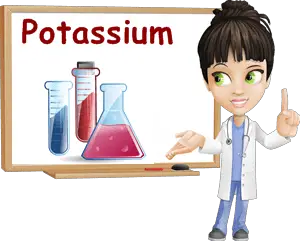As a mineral of great dietary value, potassium helps maintain a healthy heart, ensures body fluid balance and helps regulate blood pressure and heart rate. Potassium is by far one of the most health-friendly nutrients. It is present in practically every cell of our body from where it ensures fluid balance, a valuable body function. Potassium carries a positive electrical charge within the body and is one of four major electrolytes capable of rehydrating the body after prolonged workout sessions or following episodes of vomiting and severe diarrhea.
In addition to this, it supports the activity of the heart in particular, due to its capacity to control electrical impulses sent to muscles. This action, combined with its fluid-balancing properties, has a direct beneficial effect on blood pressure. Potassium, often combined with magnesium, represents a great remedy for the treatment of high blood pressure, often deemed as efficient as traditional blood pressure medication. However, this alternative treatment can only be pursued at the recommendation and under the careful supervision of a medical professional.

What are the benefits of potassium?
When daily requirements are met, potassium promotes an overall good state of health. First of all, it regulates body fluids. What does this mean more exactly? As an electrolyte, it ensures the body has enough water in and out of cells to conduct electrical impulses from neurons (nerve cells) to muscles and back. As a result, potassium supports the good functioning of both nerve cells and muscles and ensures a good communication between the nervous system and muscles. Since the heart is a muscle too, an adequate intake of the mineral will contribute to keeping it healthy as well.
How does potassium work to regulate blood pressure?
Potassium basically helps ensure nervous impulses are sent to heart at proper intervals, resulting in controlled, rhythmic contractions, not too fast and not too slow. This means a good heart rate and good blood pressure levels. Moreover, it counteracts the negative effects of too much sodium (salt). When we eat too salty, our body takes up more sodium than it needs and sodium promotes water retention. This means a higher blood volume in our circulatory system, blood that the heart has to work harder to pump.
Because it’s a greater amount of blood, our heart not only has to work harder, but the pressure the blood exerts on artery walls is greater. This translates into a higher blood pressure (of blood on artery walls), but since potassium regulates fluids in general, it also ensures a proper blood volume that exerts a normal pressure on artery walls, hence it’s blood pressure-regulating effects.

Last, but not least, it regulates kidney function. To be more exact, potassium maintains a balance between the amount of liquid taken in by the body and the amount of liquid eliminated by the kidneys, contributing to their good functioning. This, in turn, helps prevent the retention of too much water in the body as a whole and swollen legs or feet, bloating and other related symptoms.
Potassium deficiency
But what happens when our diet fails to provide adequate amounts of potassium? What are the symptoms of a deficiency? Potassium deficiency is know as hypokalemia (alternative spelling: hypokalemia). This basically refers to low or insufficient amounts of potassium in the blood. Hypokalemia symptoms may vary considerably depending on the severity of the condition, but nonetheless emphasize the importance of the mineral for good health and its role in the human body. The most telling signs and symptoms of potassium deficiency are:
Bloating, pain and cramping
Bloating, pain and cramping at stomach level. A severe potassium deficiency causes the muscles of the stomach, known as skeletal muscles, to become weak, cramp and cause bloating, pain and discomfort. Because it affects the smooth muscles of the gastrointestinal tract as well, hypokalemia may also lead to constipation.
In case of extremely low potassium levels in the body, the bowels may stop working altogether, causing paralytic ileus, a condition in which normal digestive movement ceases. This malfunction or impairment of intestinal muscles and nerves is very often a result of electrolyte imbalance or very poor potassium levels and requires immediate medical attention. Nevertheless, it is not common.
Muscle cramps, tingling and numbness
Potassium deficiency means nerves cannot function properly as electric impulses from the brain to the muscles are not transmitted properly. This, in turn, leads to numbness and tingling sensations, especially in the hands and feet, as well as peculiar burning sensations felt at the level of various muscles of the body, painful muscle cramps, muscle contractions and even eyelid twitching or twitching of the thighs or calves.
Arrhythmia
Heart palpitations, perturbed heart rhythm, extrasystoles (or premature heart beats) and even cardiac arrest are symptoms of a potassium deficiency. Sufficient dietary potassium ensures a proper conduction system through which electric impulses reach the heart at regular intervals, causing rhythmic contractions. In case of a deficit, there is a disturbance in the normal rhythm of the heart. Skipped heart beats, premature or double heart beats (also known as extrasystoles), rapid, violent or very slow beatings of the heart are all symptoms of hypokalemia. When there is a severe potassium deficiency, cardiac arrest may install.
Frequent urination and constant thirst
Frequent urination and constant thirst sensation. These are fairly common symptoms of hypokalaemia and are caused by a malfunctioning of the kidneys due to an electrolyte imbalance.
Dizziness and fainting
Potassium deficiency causes an electrolyte imbalance due to which kidneys lose their ability to concentrate waste products from the blood. As a result, they simply eliminate water, causing both an excessive liquid loss and a sudden drop in blood pressure (or hypotension). This, in turn, leads to dizziness or fainting, occurring most often when standing.
Muscle paralysis
Extreme potassium loss may induce a state of continuous muscle contraction called tetany which is basically a form of paralysis. This may also affect breathing muscles and cause shallow breathing and respiratory problems.
Rhabdomyolysis
Rhabdomyolysis is the breaking down of skeletal muscles and may occur as a result of severe hypokalemia. Associated symptoms of rhabdomyolysis include muscle weakness, stiffness and pain, as well as dark-colored urine.
Find out more about urine colors and what they mean.
Conclusion
Potassium balances sodium levels in the blood, counteracting the harmful effects of excess sodium in one’s diet. A diet rich in potassium implies good blood pressure parameters and prevents fluid retention and the problems that come with it, from bloating to swollen legs, swollen ankles, swollen feet and face puffiness. Last but not least, always remember that potassium goes very well with magnesium, a super duo for good health, particularly cardiovascular health.
